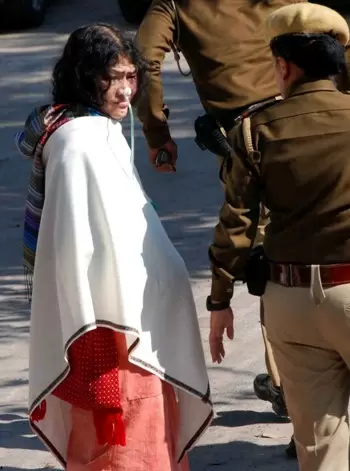‘For me success is that very inspiration that I get from my surroundings’
11-October-2014
Vol 5 | Issue 41
Who hasn’t heard of Irom Sharmila? A simple Manipuri girl, whose life once revolved around her family and her poetry, she is an “icon of public resistance” in India today, having been on a fast for the last 14 years demanding the repeal of the Armed Forces Special Powers Act (AFSPA).
Over the years she has been arrested and re-arrested, confined to a hospital bed and forced fed through a tube, but her resolve remains unshaken. In August 2014, three days after the court ordered her release, Sharmila was once again taken into custody.
It remains to be seen if and when she would regain her freedom. In this excerpt from Kishalay Bhattacharjee’s book, Che in Paona Bazaar, published by Pan Macmillan, the author and senior journalist, recalls the time he met Sharmila.
 |
|
Irom Sharmila is an “icon of public resistance” in India today, having been on a fast for the last 14 years demanding the repeal of the Armed Forces Special Powers Act (Photo: Indian Photo Agency)
|
I never had the inclination to meet her personally. Maybe I did not have the courage to meet her because I was not sure of how a person can generate so much conviction. She has not suffered any personal loss but the loss of her people in conflict moved her to carry on the world’s longest non-violent protest.
I finally met her the year she completed a decade of her fast. I assumed that her thoughts would be incoherent, but I was mistaken.
There are certain pictures of hers which are circulated regularly; the impression that one gathers from those is that her room is a small, cramped space with graffiti and posters and her scribbles on the walls.
A tube attached to her nose, force-feeding her, makes one uncomfortable to continue a conversation. She is generally wrapped in a checkered blanket and a flask of hot water is placed on a hospital table next to her bed.
She writes poems and also reads quite a lot; she gets a regular supply of books in Manipuri. How can anyone without taking a drop of water in a decade afford to think rationally? And even if she is thinking coherently, is the fight against the draconian act forcing her to continue her fast or is it that she has gone too far and therefore, can’t give up her fight?
Have her people for whom she has been fasting ever asked her to give up this struggle? Not supporting Sharmila would be tantamount to treason in Manipur, but the support is only a posture. Her struggle has been painfully lonely.
Sharmila looks back at the last ten years and asks, ‘Why not? For me success is that very inspiration that I get from my surroundings.’ She laughs: ‘The positive inspiration for the upliftment of society.’
Sharmila’s eyes and speech had no achievements to claim but she is aware of what has sustained her through an entire decade. ‘My conscience, that’s all.’ …
The hard-won hour-long interview was spent mostly in edgy silences. As if she was asking me … I am living the struggle … I am living my protest … what more can my words give you … that my life already doesn’t? But all she said was, ‘I want the Act repealed. That’s all.’ …
2 November 2000. Ten people waiting for a bus under a makeshift shed were shot dead by soldiers of the Assam Rifles. In the last thirteen years, the overarching theme in Manipur has been one woman’s resolve to fight the Armed Forces Special Powers Act (AFSPA), which gives immunity to army excesses. Though the memorial of the massacre is covered with weeds and shrubs, Sharmila has become a symbol of resistance, unprecedented anywhere in the world. …
It was at Malom Bazaar that Sharmila began her protest. She had gone for a discussion on governance and when she got home, she was told about the incident. She took a bus to Malom and sat on an unoccupied verandah on the roadside. Malom was unhappy with her presence. They didn’t want any retaliation by the army. They were numbed into silence. But she carried on. A day later, they say the police arrested her.
Eleven winters have gone by in Malom. During which one half-hearted inquiry has been conducted. All the Assam Rifles men who fired those bullets have got away without a trial.
Sharmila had an unusual childhood. As a child she would write poems on issues like social justice. In a non-vegetarian household, she would consume raw vegetables from her kitchen garden. As she grew up she started writing on gender issues while continuing to write her poems. Even today, in her jail ward at Jawaharlal Nehru Hospital, she maintains a diary. This is a poem she wrote in the beginning of 2010:
Who am I?
What am I doing? Where am I located?
Who is making me sit here?
Until when?
What is it that they want me to do?
What is my vision?
Her mother Irom Sakhi Devi sits in the courtyard of their house with a stoic expression: ‘I am a proud mother, but my daughter hasn’t had a single drop of water in ten years so there is sorrow. Even if the Act can be repealed for five days, I think she can be saved. Just five days.’ …
Caught between human rights and inhuman wrongs over the last ten years, Sharmila has inspired a range of work; from films to theatre, she has had a number of organizations rallying around her. Therein lies the irony – what she set out to achieve is perhaps being overshadowed by the volume of work on her.
Many tributes are prepared every year, most are weak and superficial. None carry the force to empower Sharmila’s somewhat-diminishing cause. Candles are regularly lit at Delhi’s Raj Ghat where Sharmila once escaped and sat on a fast. Men and women hold rallies, music fests, seminars in the capital wearing Save Sharmila T-shirts. Sharmila tells me, ‘Let us realize why we are here in this world, how, when we will go away from here; this is our bounden duty to just self-realize.’
She reads the Gita every day and spends some time practicing yoga. As I walked into her room, she was lying down in solitary confinement, force-fed through a tube. Her satyagraha and search continues as she says with eyes closed, ‘What is it that they want me to do? What is my vision?’ But life around Sharmila’s hospital ward goes on as usual.
Not very far from her jailhouse are women almost hanging from jeeps and rickshaws carrying their wares and produce, headed for the market. What drives these women to possess such a dogged sense of self-assertion is the stuff of legends. The ordinary woman on the road is as steely as any storybook character.
(Excerpts from Che in Paona Bazaar by Kishalay Bhattacharjee; Published by Pan Macmillan; Pp: 241; Price: Rs 399.) - Women's Feature Service















